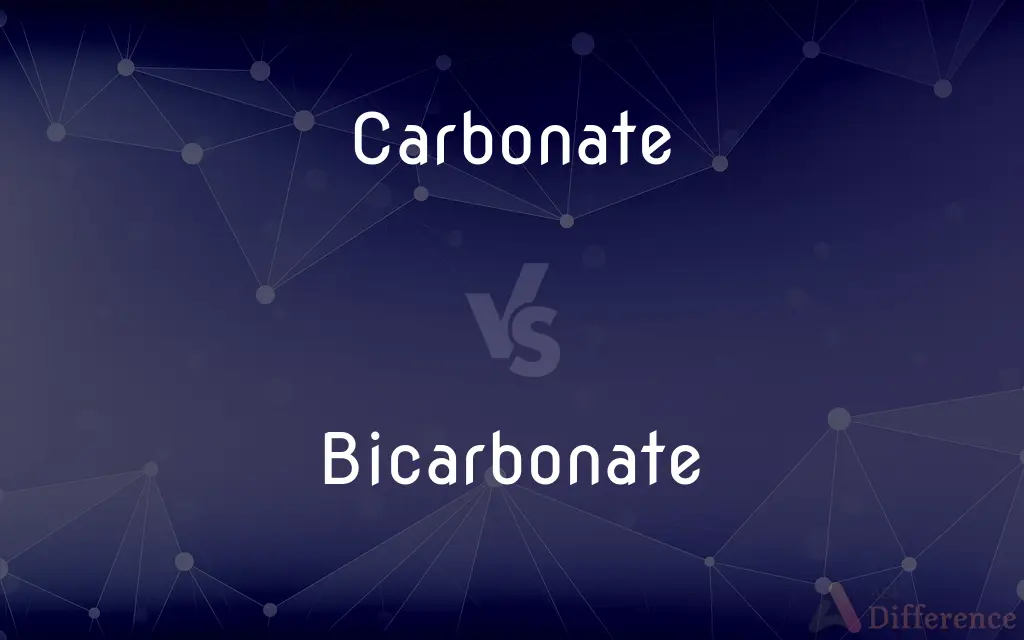Carbonate vs. Bicarbonate — What's the Difference?
By Tayyaba Rehman & Maham Liaqat — Updated on March 26, 2024
Carbonate is a salt of carbonic acid featuring a carbonate ion (CO3^2-), while bicarbonate is a hydrogen carbonate with a bicarbonate ion (HCO3^-).

Difference Between Carbonate and Bicarbonate
Table of Contents
ADVERTISEMENT
Key Differences
Carbonates are inorganic compounds that contain the carbonate ion, CO3^2-. These compounds form when a metal reacts with carbonic acid, resulting in salts that are commonly found in the earth's crust. Carbonates are integral to the formation of limestone and are used in various industrial processes, such as cement production. Bicarbonates, also known as hydrogen carbonates, contain the bicarbonate ion, HCO3^-. They are formed by the partial neutralization of carbonic acid with a base and are more soluble in water compared to carbonates. Bicarbonates play crucial roles in biological systems, especially in regulating pH levels in the blood.
In terms of chemical structure, the carbonate ion consists of one carbon atom covalently bonded to three oxygen atoms in a trigonal planar arrangement, carrying a -2 charge. The bicarbonate ion is similar but has a hydrogen atom attached to one of the oxygen atoms, resulting in a -1 charge. This slight structural difference significantly impacts their properties and reactivity. Carbonates tend to be more stable and less soluble in water, whereas bicarbonates are more reactive, especially with acids, and more soluble.
The applications of carbonates extend beyond geological formations; they are used in the glass and ceramics industry, as well as in the removal of sulfur dioxide from industrial emissions. Bicarbonates, on the other hand, have widespread use in everyday life, most notably as baking soda (sodium bicarbonate), which is used in baking as a leavening agent. Bicarbonates are also essential in medicine for treating acid indigestion and in fire extinguishers due to their ability to release carbon dioxide when heated.
Environmental impact and natural processes involving carbonates and bicarbonates are significant for the carbon cycle. Carbonates in rock formations act as long-term carbon storage, while bicarbonates in water bodies contribute to temporary carbon sequestration and affect aquatic life by influencing water pH. The solubility of bicarbonates also plays a crucial role in the formation of caves and stalactites/stalagmites through the dissolution and reprecipitation of calcium carbonate.
In summary, while both carbonates and bicarbonates are related to carbonic acid and play essential roles in nature and human activities, their chemical properties, reactivity, and applications differ markedly. Carbonates are key to geology and industry, forming the basis of many minerals and industrial processes. In contrast, bicarbonates are more involved in biological and everyday applications, from cooking to medical treatments, reflecting their greater reactivity and solubility.
ADVERTISEMENT
Comparison Chart
Chemical Formula
CO3^2-
HCO3^-
Charge
-2
-1
Solubility
Less soluble in water
More soluble in water
Stability
More stable
Less stable, more reactive
Common Uses
Limestone, cement, glass
Baking soda, medical uses
Environmental Role
Carbon storage in rocks
Carbon sequestration in water
Reactivity
Reacts with acids to release CO2
Reacts readily with acids
Compare with Definitions
Carbonate
Found in earth's crust and ocean sediments.
Carbonate minerals contribute to the hardness of water.
Bicarbonate
A salt or ester of carbonic acid containing HCO3^-.
Sodium bicarbonate (baking soda) is used in baking.
Carbonate
Integral to geological formations.
Carbonate rocks like limestone are common in karst landscapes.
Bicarbonate
More soluble and reactive than carbonates.
Bicarbonate buffers maintain pH balance in blood.
Carbonate
A salt containing the carbonate ion CO3^2-.
Calcium carbonate (limestone) is used in construction.
Bicarbonate
Essential in biological systems.
Bicarbonate ions play a crucial role in the carbon cycle.
Carbonate
Forms by the reaction of carbonic acid with metals.
Sodium carbonate is used in glassmaking.
Bicarbonate
Involved in water pH regulation.
Bicarbonate levels in aquatic ecosystems affect organism health.
Carbonate
Used in industrial emissions control.
Magnesium carbonate helps remove sulfur dioxide from flue gases.
Bicarbonate
Used in medical treatments.
Bicarbonate solutions are used to treat acidosis.
Carbonate
In chemistry, a carbonate is a salt of carbonic acid (H2CO3), characterized by the presence of the carbonate ion, a polyatomic ion with the formula of CO2−3. The name may also refer to a carbonate ester, an organic compound containing the carbonate group C(=O)(O–)2.
Bicarbonate
In inorganic chemistry, bicarbonate (IUPAC-recommended nomenclature: hydrogen carbonate) is an intermediate form in the deprotonation of carbonic acid. It is a polyatomic anion with the chemical formula HCO−3.
Carbonate
A salt of the anion CO₃²⁻, typically by reaction with carbon dioxide.
Bicarbonate
The polyatomic anion HCO3- or a compound, such as sodium bicarbonate, containing it.
Carbonate
Dissolve carbon dioxide in (a liquid).
Bicarbonate
(chemistry) the univalent anion HCO3-; any salt of carbonic acid in which only one of the hydrogen atoms has been replaced.
Carbonate
To add carbon dioxide gas to (a beverage) so that bubbles are produced upon release from a container.
Bicarbonate
Sodium bicarbonate used as a mild antacid; bicarbonate of soda
Carbonate
To burn to carbon; carbonize.
Bicarbonate
A carbonate in which but half the hydrogen of the acid is replaced by a positive element or radical, thus making the proportion of the acid to the positive or basic portion twice what it is in the normal carbonates; an acid carbonate; - sometimes called supercarbonate.
Carbonate
To change into a carbonate.
Bicarbonate
A salt of carbonic acid (containing the anion HCO3) in which one hydrogen atom has been replaced; an acid carbonate
Carbonate
The anionic divalent group CO3, derived from carbonic acid, or a compound containing this group.
Carbonate
Any salt or ester of carbonic acid. Category:en:Carbon
Carbonate
(transitive) To charge (often a beverage) with carbon dioxide.
Carbonate
A salt or carbonic acid, as in limestone, some forms of lead ore, etc.
Carbonate
A salt or ester of carbonic acid (containing the anion CO3)
Carbonate
Treat with carbon dioxide;
Carbonated soft drinks
Carbonate
Turn into a carbonate
Common Curiosities
What role do carbonates play in water hardness?
Carbonates, especially calcium and magnesium carbonates, contribute to water hardness, affecting water quality and usage in domestic and industrial settings.
Can bicarbonate act as a buffer?
Yes, bicarbonate serves as a crucial buffer in biological systems, especially in regulating blood pH by neutralizing acids.
Why are bicarbonates important in everyday life?
Bicarbonates, like sodium bicarbonate (baking soda), are widely used in baking, cleaning, and medical applications due to their reactivity and solubility.
Can the conversion between carbonate and bicarbonate in water impact aquatic life?
Yes, shifts between carbonate and bicarbonate ions in water affect pH and carbonate hardness, which can influence the health and reproduction of aquatic organisms.
What distinguishes carbonate from bicarbonate chemically?
The key difference is the presence of an additional hydrogen atom in bicarbonate (HCO3^-), making it more soluble and reactive than carbonate (CO3^2-).
How do carbonates contribute to the carbon cycle?
Carbonates in rock formations act as long-term carbon storage, playing a vital role in the global carbon cycle and earth's climate system.
How does temperature affect the solubility of carbonates and bicarbonates in water?
Generally, the solubility of bicarbonates in water increases with temperature, which is crucial for processes like cooking and industrial applications. For carbonates, solubility varies with the specific compound and can decrease as temperature rises, affecting geological processes.
What is the environmental significance of the carbonate-bicarbonate buffer system in oceans?
The carbonate-bicarbonate buffer system helps stabilize ocean pH, which is vital for marine life, especially for organisms that build shells or skeletons from calcium carbonate. This buffering capacity is also crucial in mitigating ocean acidification caused by increased CO2 levels.
How do carbonates and bicarbonates affect environmental pH?
Carbonates can buffer soil pH, while bicarbonates in water bodies buffer pH changes, influencing ecosystem health and chemical reactions in the environment.
Why is bicarbonate added to drinking water?
Bicarbonate is added to drinking water to improve taste, neutralize excess acidity, and help maintain a stable pH, enhancing water quality and safety for consumption.
Share Your Discovery

Previous Comparison
Plurality vs. Majority
Next Comparison
Solid vs. HardAuthor Spotlight
Written by
Tayyaba RehmanTayyaba Rehman is a distinguished writer, currently serving as a primary contributor to askdifference.com. As a researcher in semantics and etymology, Tayyaba's passion for the complexity of languages and their distinctions has found a perfect home on the platform. Tayyaba delves into the intricacies of language, distinguishing between commonly confused words and phrases, thereby providing clarity for readers worldwide.
Co-written by
Maham Liaqat













































